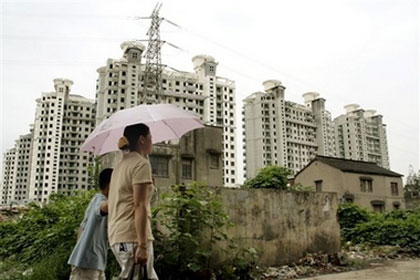The widespread speculation in the past two months that
sellers of second-hand houses will be subject to a 20 per cent individual income
tax has been confirmed as true after a new tax measure was announced this week
on Wednesday.

Neighbors walk past old houses to be
demolished to build new apartment complex with new apartment buildings
under construction as background Monday, July 24, 2006 in Shanghai.
[AP] |
The new measure, effective on August 1, was officially issued by the State
Administration of Taxation on July 18, but it was only made public on late
Wednesday afternoon.
"Our clients have reacted calmly to this new tax measure, probably because
they heard of the news long before," said Ye Houbiao, vice-director of Pudong
New District of Shanghai Centaline Property Agency Ltd in Shanghai.
Its sudden introduction, Ye said, hasn't created a shock effect like that two
months ago, when the government decided, seemingly in haste, to impose the 5.5
per cent house transaction fees.
But "the rush to pay the tax before the deadline will be the same," said Lu
Binbin, general manager of East China of 5i5j Property Company.
Two months ago, house sellers flooded the trading centre in efforts to beat
the tax deadline of June 1 and avoid the 5.5 per cent transaction fees; now they
are expected to do the same before August 1 to avoid the newly added 20 per cent
individual income tax, but "with a better prepared mind-set," said Lu.
"The new tax measure will affect sellers more seriously than buyers," said Ye
Houbiao.
Ye added that "most of the sellers will choose to raise the price or abandon
their selling plans in order to lease out their houses instead."
Based on the study of his clients, Ye told China Daily
that some sellers who have already signed the contract with buyers but haven't
paid tax are eager to finish the transaction before August 1 in order to avoid
the individual income tax.
Fifty per cent of those sellers whose houses are still awaiting buyers
haven't yet decided how to take the next step. For now, they are keeping their
prices the same.
But some anxious sellers hope to sell their houses for 10 to 15 per cent less
than usual if property agents can find appropriate purchasers in time to finish
the transaction before August 1.
Some 20 per cent of sellers hope to make buyers pay more to cover the
individual income tax, or make a special payment if they want to purchase the
properties at the previous price.
"The transfer of the tax burden will be adopted more and more by
sellers,especially for those who bought their houses at a high price and will
definitely feel pinched by the heavy individual income tax," said Ye.
Some 30 per cent of sellers expressed the wish to drop their plans to sell
the houses and instead lease them out in order to make a long-term investment.
"Obviously, this new taxation measure will in the short run reduce the
trading volume of second-hand houses in the market and will drive up the price,"
said Weng Haitao, a researcher with the Shanghai office of Savills China.
"The cost of selling second-hand houses will be increased on the seller's
side; and purchasers will continue to maintain their wait-and-see attitude,
adopted two months ago," said Gong Min, manager of the consultancy department at
Shanghai Centaline Property Agency Ltd.
"More impact will be reflected in the market for middle- and lower-end
second-hand houses than in that for middle- and upper-end ones, since the former
is more sensitive to the price factor than the latter," Wen said.
"If taking this single new taxation measure into consideration, I would say
it may not have a strong impact on the market; but if we put this tax measure in
perspective, the impact on the market will be obviously strong."
To cool down the overheated property market in China, the central government
has adopted a series of new measures, including the implementation of the 5.5
per cent transaction fees on June 1, heralding a new round of strict regulatory
measures in the property market.
These measures include the rise of the minimum mortgage down payment to 30
per cent; the requirement that at least 70 per cent of residential construction
should be of apartments below 90 square metres in size; and the latest
restriction of foreign investment.
"In fact, the policy of imposing individual income tax on second-house
transactions was issued as early as 1999, but the individual income tax has
never been really collected in the whole nation because it is not practical and
lacks relevant details," said Gong.
On the one hand, the issuing of the new tax measure reiterates the old
policy; on the other hand, the new measure adds detailed rules based on the
present property market situation and thus secures the implementation,Gong
added.
Gong said in the long term, the new tax measure will help to check the rise
of housing prices by further adjusting the relationship between supply and
demand.
"It will completely eliminate speculation- oriented property investment due
to the increased cost for the sellers," said Gong.
She added that although the supply of the second-hand houses will be reduced
to some extent, "prices still might not rise by much, given the huge size of the
market."